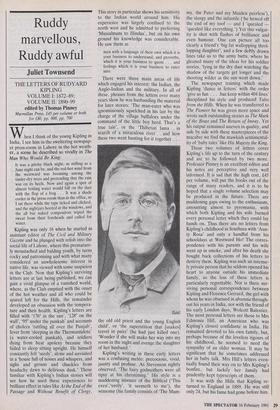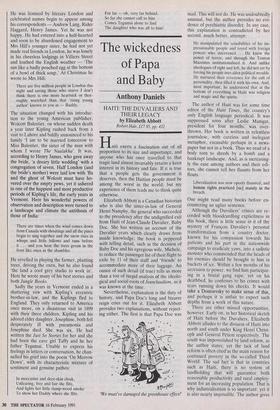Ruddy marvellous, Ruddy awful
Juliet Townsend
THE LETTERS OF RUDYARD KIPLING VOLUME I: 1872-89; VOLUME II: 1890-99 edited by Thomas Pinney
Macmillan Press, £45 per volume or both for £80, pp. 800, pp. 700
When I think of the young Kipling in India, I see him in the sweltering newspap- er press-room in Lahore in the hot weath- er, a scene he described so vividly in The Man Who Would Be King: It was a pitchy black night, as stifling as a June night can be, and the red-hot wind from the westward was booming among the tinder-dry trees and pretending that the rain was on its heels. Now and again a spot of almost boiling water would fall on the dust with the flop of a frog . . . It was a shade cooler in the press-room than in the office, so I sat there while the type ticked and clicked, and the nightjars hooted at the windows, and the all but naked compositors wiped the sweat from their foreheads and called for water.
Kipling was only 16 when he started as assistant editor of The Civil and Military Gazette and he plunged with relish into the social life of Lahore, where this premature- ly moustached and balding youth, by turns, cocky and patronising and with what many considered an unwholesome interest in native life, was viewed with some suspicion in the Club. Now that Kipling's surviving letters are at last being published, we can gain a vivid glimpse of a vanished world, where, as the Club emptied with the onset of the hot weather and all who could be spared left for the Hills, the remainder developed an obsession with the tempera- ture and their health. Kipling's letters are filled with '176° in the sun', '128' on the wall', '95° under the punkah' and accounts of cholera 'rattling all over the Punjab', fever from 'sleeping in the Thermantidote' (a water-cooled punkah), and soldiers dying from heat apolexy because they failed to sleep sitting upright. He himself constantly felt 'seedy', alone and unvisited in a 'house full of noises and whispers, and sighs and groans and chuckles from headachy dawn to delirious dusk.' Those familiar with Kipling's Indian stories will see how he used these experiences to brilliant effect in tales like At the End of the Passage and Without Benefit of Clergy.
This story in particular shows his sensitivity to the Indian world around him. His experience was largely confined to the north west and he admitted to preferring `Mussalmans to Hindus', but on his own ground his knowledge was considerable. He saw them as
men with a language of their own which it is your business to understand; and proverbs, which it is your business to quote . . . and feelings which it is your business to enter into.
There were three main areas of life which engaged his interest: the Indian, the Anglo-Indian and the military. In all of these, phrases from the letters over many years show he was husbanding the material for later stories: 'The man-eater who was ignominiously squelched in his lair by the charge of the village buffaloes under the command of the little boy herd. That's a true tale', or the `Thibetan lama . . in search of a miraculous river. . and how these two went hunting for it together. . .
the old old priest and the young English child', or 'the superstition that [snakes] travel in pairs' (he had just killed one). 'Wonder if she will make her way into my room in the night and avenge the slaughter of her husband.'
Kipling's writing in these early letters was a confusing melee: precocious, vivid, jaunty and profuse. As Stevenson rightly observed, 'The fairy godmothers were all tipsy at his christening.' His style is a maddening mixture of the Biblical (`This even','verily', 'it seemeth to me'), the winsome (his family consists of 'The Mum-
my, the Pater and my Maiden peerless'), the slangy and the infantile ('he hewed off the end of my toof — and I 'quealed — 'quealed like everything.') Yet this vulgar- ity is shot with flashes of brilliance and even humour. One can picture all too clearly a friend's `big fat wallopping throl- lopping daughter', and a few deftly drawn lines take us to the army butts, where he gleaned many of the ideas for his soldier stories, 'lying in the dry dust watching the shadow of the targets get longer and the shooting wilder as the sun went down.'
The newspaper training which made Kipling 'dance in fetters' with the order 'give us fun . . . .but keep within 404 lines' disciplined his style and produced Tales from the Hills. When he was transferred to The Pioneer he was given more space and wrote such outstanding stories as The Mark of the Beast and The Return of Imray. Yet his output remained uneven in quality, and side by side with these masterpieces of the macabre we find the mawkish sentimental- ity of 'baby tales' like His Majesty the King.
These two volumes of letters cover Kipling's life up to the turn of the century and are to be followed by two more. Professor Pinney is an excellent editor and his notes are perceptive and very well informed. It is sad that the high cost, £45 per volume, will put the books out of the range of many readers, and it is to be hoped that a single volume selection may be produced in the future. There are maddening gaps owing to the enthusiasm, amounting almost to pyromania, with which both Kipling and his wife burned every personal letter which they could lay hands on. Thus there are no letters from Kipling's childhood in Southsea with 'Aun- ty Rosa' and only a handful from his schooldays at Westward Ho! The corres- pondence with his parents and his wife went up in smoke, and after his death she bought back collections of his letters to destroy them. Kipling was such an intense- ly private person that he seldom opened his heart to anyone outside his immediate family, so the loss of these letters is particularly regrettable. Nor is there sur- viving personal correspondence between Kipling and Florence Gerrard, the girl with whom he was obsessed in absentia through- out his years in India, nor with the friend of his early London days, Wolcott Balestier. The most personal letters are those to Mrs Edmoni a Hill, an American who was Kipling's closest confidante in India. He remained devoted to his own family, but, perhaps because of the loveless rigours of his childhood, he seemed to need the sympathy of an older woman. It may be significant that he sometimes addressed her in baby talk. Mrs Hill's letters even- tually found their way on to Mrs Kipling's bonfire, but luckily her family had prudently kept typescripts of them.
It was with the Hills that Kipling re- turned to England in 1889. He was still only 24, but his fame had gone before him. He was lionised by literary London and celebrated names begin to appear among his correspondents — Andrew Lang, Rider Haggard, Henry James. Yet he was not happy. He had entered into a half-hearted and soon to be abandoned engagement to Mrs Hill's younger sister, he had not yet made real friends in London, he was lonely in his cheerless lodgings in Villiers Street and loathed the English weather — 'The sun like a badly poached egg at the bottom of a bowl of thick soup.' At Christmas he wrote to Mrs Hill:
There are five million people in London this night and saving those who starve I don't think there is one more heartsick or thor- oughly wretched than that 'rising young author' known to you as — Ruddy.
The situation changed with his introduc- tion to the young American publisher, Wolcott Balestier, on whose sudden death a year later Kipling rushed back from a visit to Lahore and baldly announced to his family 'I am to be married tomorrow to Miss Balestier, the sister of the man with whom I wrote The Naulakha'. It was, according to Henry James, who gave away the bride, 'a dreary little wedding' with a congregation of seven. Half London (and the bride's mother) were laid low with 'flu and the ghost of Wolcott must have ho- vered over the empty pews, yet it ushered in one of the happiest and most productive periods of Kipling's life, the early years in Vermont. Here his wonderful powers of observation and description were turned to a landscape and climate the antithesis of those of India:
There are times when the wind comes down from Canada with shoutings and all the pines begin to sing together and the snow rises in whisps and little billows and runs before it . . and you hear the trees groan in the frost like oxen in the shambles.
He revelled in playing the farmer, planting trees, driving the oxen, but he also found 'the land a cool grey studio to work in'. Here he wrote many of his best stories and both Jungle Books.
Sadly the years in Vermont ended in a shattering row with Kipling's eccentric brother-in-law, and the Kiplings fled to England. They only returned to America once more, on a disastrous visit in 1899 with their three children. Kipling and his adored elder daughter, Josephine, both fell desperately ill with pneumonia and Josephine died. She was six. He had written the Just So Stories for her and she had been the cave girl Taffy and he her father Tegumai. Unable to express his feelings in letters or conversation, he chan- nelled his grief into the poem 'On Merrow Down', with its characteristic mixture of sentiment and genuine pathos:
In moccasins and deer-skin cloak, Unfearing, free and fair she flits, And lights her little damp-wood smoke To show her Daddy where she flits. For far — oh, very far behind, So far she cannot call to him Comes Tegumai alone to find The daughter who was all to him!



















































 Previous page
Previous page